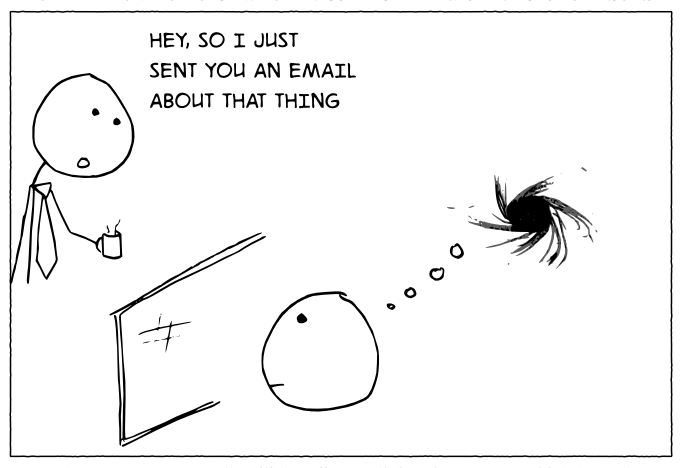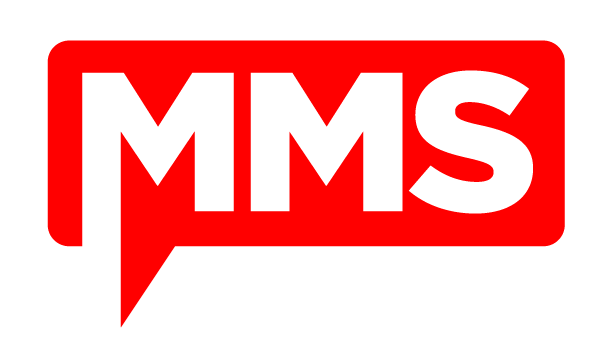
Interruptions and Intentionality
- Matt Zaske
- December 28, 2020
- 5 minutes
Interruptions: they're everywhere.
I stumbled across this cartoon some time ago (fall of 2019) and saved it as something to write about. The simple content struck me as something I deal with multiple times daily. For a host of reasons what used to be a more acute issue with interruptions at work had become a more chronic problem, at least until the pandemic hit and we were faced with the new reality of quarantine, isolation, and formal remote work arrangements. I've been editing this post for somewhere around eight months.
I have the great fortune of a regular day job that allows me the combination of some specialization while maintaining a mix of all sort. The 'not-a-generalist-but-got-fingers-in-a-lot-of-diverse-stuff' sort of role. Being involved with several sub-teams, projects, and other commitments, when things are humming along, prioritization is manageable with proper team planning and shared goals. There are always hiccups here and there, and that's cool. Interruptions aren't usually too big a deal. While I don't mind the periodic social interruption of a well-functioning office environment, the reality is that I (and other teammates) had needed to deliberately isolate to focus on particular projects, and that more often than ever. In a twist of fate the pandemic hit and turned it all upside down. However, this overturn brought a "new normal" into focus: more direct control over the interruptions I could (and would) allow into my flow moments.
Remote Work
I have long been a proponent of remote/flexible work arrangements, and often called on them to work primarily through rough winter weather (and/or blizzard) events, or in the case of other projects...just power through backlogs of work from an isolated location. Ironically, I was working remotely (for the reason of prioritizing some backlogged stuff) the week in March when our institution pivoted to remote arrangements for everyone, which actually meant I had to go back to the office to prepare and provide equipment for the masses.
What I have enjoyed most about remote arrangements is more full control over my personal interruptions. Specifically, the phone calls and office visits. I enjoy a good casual social office visit just as much (probably more than) anyone else, but these can really become huge interruptions in flow, especially when the visit is predicated on a random follow-up of "the thing I asked about before..." sort of business.
What I've found worse yet is the random instant message (from folks outside of our unit) with zero context: "Hey." is about the worst way these start.
For this reason, among others, I have come to intentionally block out the most common interruptions for long periods of time (email only a few times per day, voicemail perhaps 1-2 times per week), and pay more guarded attention to internal messaging (Slack, etc.) based on custom channel notification preferences. This has worked out well for me, and allows for contact/accessibility as needed, but not more than necessary. The details are always changing based on the priority projects or tasks of the day, so it's also not a "I always block out from X to Y on weekdays" and more of a "I often block out X to Y during the midweek, but leave it open on other days (or shift to another time) to accommodate..."
We even implemented a high-priority notification mechanism courtesy of Slack webhooks for some team-wide urgent notifications, further bolstering the power of a tool like Slack to enhance our reachability while preserving focus.
The New Normal
Based on our current guidance, the directive has been laid out that those who can work from home will continue to do so into/through next summer. What great privilege we have in this flexibility.
As our academic year was spinning up, I spent more time on campus in preparation than I'd previously spent on campus (in total) since March. Most of my time physically on site related to staging equipment, so it was done in solitude and before folks really returned to campus (for those who did return). As folks returned to campus, I returned to work from home. My current arrangement is work from home unless otherwise necessary, and given the host of remote tools we have (combined with others in our unit who are more often in/around campus), this minimizes my need to physically be on site. Time on site, however, has been refreshing. I have been able to get a "fix" of some much-needed "social" time in person, but in a responsible and productive way. I have come to reset my expectations for what I can (or will not be able to) get done on an "in-office" day. In so doing, I have much more direct control over my interruptions and have been able to turn out much better, sometimes more timely work than otherwise might have been possible. As of late, most of my visits to campus/office are in off hours (evenings, usually) to pick up or address random things. I usually coordinate those visits/trips with a grocery or takeout run, since I live some distance from campus.
Regardless, once the pandemic situation "ends," I anticipate making a "split-week" arrangement where I will continue to have deliberate and planned chunks of remote time to work. This should help with proper project and team/unit/organizational planning, where we can set meaningful project goals and deadlines, and shift to better delivery of said items.
As we close out the decade that has been 2020 and enter 2021, I would definitely encourage you to try fiddling with the interruptions of which you have more direct control (or influence). Doing so has helped me tremendously, and hopefully can help you be more "productive" (interpreted in the broadest work and health sense) in the future!






